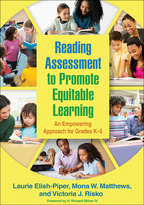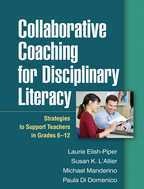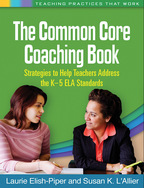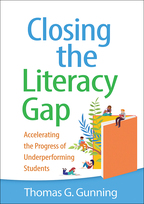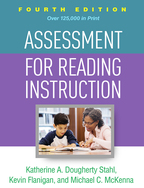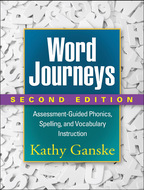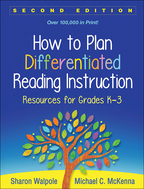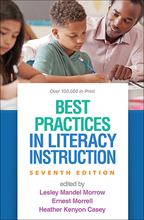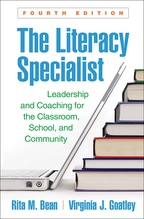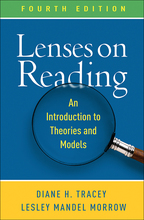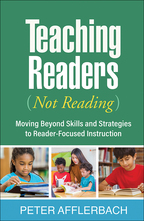Reading Assessment to Promote Equitable Learning
An Empowering Approach for Grades K-5
Laurie Elish-Piper, Mona W. Matthews, and Victoria J. Risko
Foreword by H. Richard Milner
HardcoverPaperbacke-bookprint + e-book
Hardcover
orderSeptember 5, 2022
ISBN 9781462549986
Price: $65.00 340 Pages
Size: 7" x 10"
Paperback
orderSeptember 5, 2022
ISBN 9781462549979
Price: $43.00340 Pages
Size: 7" x 10"
e-book
orderJuly 6, 2022
PDF and Accessible ePub ?
Price: $43.00 340 Pages
ePub is Global Certified Accessible
print + e-book $86.00 $51.60
orderPaperback + e-Book (PDF and Accessible ePub) ?
Price: 340 Pages
ePub is Global Certified Accessible
The reproducible materials can be downloaded and printed in PDF format.
“This book issues a resounding call to remove the cloak of invisibility in literacy assessment and foster more informed and equitable instructional practices. Building on their extensive experience and research with children and families, the authors make teachers and students visible, and show what standard assessments fail to tell us. The book features authentic vignettes with roadmaps to guide literacy professionals in implementing assessments in a diversity of school settings across different geographic locations. This is a much-needed resource for empowering students and teachers in today’s schools.”

—Doris Walker-Dalhouse, PhD, Department of Educational Policy and Leadership, Marquette University
“A child's understanding of reading is about more than decoding—it involves prior experience, linguistic knowledge, agency, interests, and emotions. This book embraces cultural responsiveness in assessment, and is a needed professional development resource and text for all who provide reading instruction. The chapters present research, theory, and procedures for conducting assessments that capture children’s capabilities as well as their needs.”

—Lesley Mandel Morrow, PhD, Distinguished Professor and Director, Center for Literacy Development, Graduate School of Education, Rutgers, The State University of New Jersey
“Elish-Piper, Matthews, and Risko definitively place assessment back in the hands of teachers and their students. The authors’ strengths-based, humanizing approach to reading assessment puts students’ sense of self and agency first, and respects teachers as professionals and decision makers about what is right for their students. The book is packed with how-to suggestions, theoretical knowledge, and classroom vignettes. Teachers, administrators, and teacher educators will find clear guidance on a full suite of assessments that move beyond standardized measures toward ways to promote deeper engagement and learning. The authors demonstrate their deep understanding of the complex undertaking of assessing each student’s reading identities and abilities.”

—Dana A. Robertson, EdD, School of Education, Virginia Tech
—Doris Walker-Dalhouse, PhD, Department of Educational Policy and Leadership, Marquette University
“A child's understanding of reading is about more than decoding—it involves prior experience, linguistic knowledge, agency, interests, and emotions. This book embraces cultural responsiveness in assessment, and is a needed professional development resource and text for all who provide reading instruction. The chapters present research, theory, and procedures for conducting assessments that capture children’s capabilities as well as their needs.”
—Lesley Mandel Morrow, PhD, Distinguished Professor and Director, Center for Literacy Development, Graduate School of Education, Rutgers, The State University of New Jersey
“Elish-Piper, Matthews, and Risko definitively place assessment back in the hands of teachers and their students. The authors’ strengths-based, humanizing approach to reading assessment puts students’ sense of self and agency first, and respects teachers as professionals and decision makers about what is right for their students. The book is packed with how-to suggestions, theoretical knowledge, and classroom vignettes. Teachers, administrators, and teacher educators will find clear guidance on a full suite of assessments that move beyond standardized measures toward ways to promote deeper engagement and learning. The authors demonstrate their deep understanding of the complex undertaking of assessing each student’s reading identities and abilities.”
—Dana A. Robertson, EdD, School of Education, Virginia Tech

